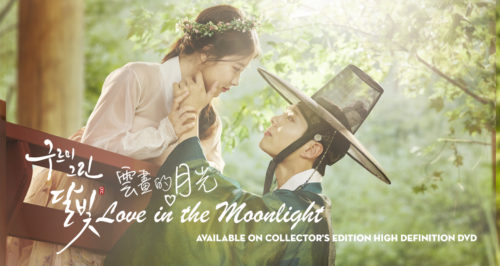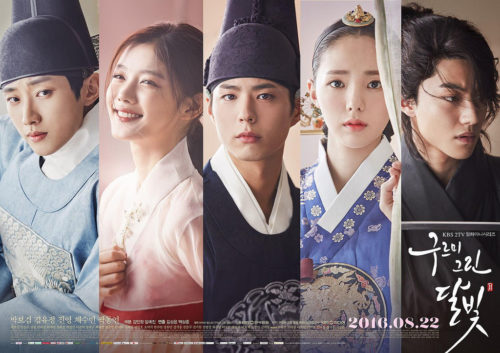K-drama review: Love in the Moonlight

One of the major genres of Korean TV is historical epic, so I thought I should try one out. I sampled a few before settling on 2016’s Love in the Moonlight (also known as Moonlight Drawn by Clouds). I think I was drawn to the romance element (as well as the Shakespearean cross-dressing comedy) so I perhaps shouldn’t have been surprised that this shared a lot in common with Boys Over Flowers. And I do mean a lot.
First thing they have in common: they were both phenomenally successful shows based on books – in this case the novel Moonlight Drawn by Clouds, which was serialized online in 2013 and then published as five separate books in 2015. (I would love to add who wrote the book but there is very limited info available in English and my Korean is non-existent.)
The series is set during the 19th century Joseon era, and opens with our heroine, Hong Ra-on (played by Kim Yoo-jung), living as a man in order to support herself. She has multiple jobs but is still drowning in debt.
Circumstances – both comedic and romantic – cause Ra-on to cross paths with nobleman Kim Yoon-sung (played by Jung Jin-young) and the Crown Prince (played by Park Go-bum). Yoon-sung immediately figures out that she is a woman, and helps her to escape some nasty creditors. The prince is less astute, but then he too is in disguise when he first meets Ra-on – as a mere nobleman – and they both take far too long to figure out the truth.
Ra-on’s debts end up getting her sold to the eunuchs training academy, from which she is sent to the royal palace to work. A combination of good luck, wiles and helpful friends protect her from every attempt to castrate/check that she has already been castrated. She befriends the prince (who is still hiding his identity from her) and his best friend and personal guard Kim Byung-yeon (Kwak Dong-yeon).
The early episodes are fun and light. Ra-on is brazen in her attempts to escape the palace and get back to the city outside. She eats and drinks and jokes like a man. There is also some set-up of the political machinations that form the main non-romance plot. Essentially the king has been manipulated by his largely corrupt advisers into being a paranoid, weak ruler who does whatever Chief Adviser Kim tells him to.
Inevitably, both Yoon-sung and the prince fall in love with Ra-on. One of the more interesting aspects of the series is that the prince truly believes she is a man and is genuinely confused by his feelings for her, but continually makes those feelings obvious to everyone around him. (I guess cross-dressing comedy has always been a way to explore sexuality themes.) Sweetly, Byung-yeon proves his friendship with the prince and Ra-on by supporting this blossoming romance, where everyone else expresses concern (or glee at the prospect that this could oust the prince).

Initially, Yoon-sung seems like the better match. He is a painter and scholar, sensitive and smart enough to figure out both who the new Eunuch Hong is and why she might be living in disguise (though both of these do turn out to be more complicated than even Ra-on herself realises). The prince is considered a tearaway by the palace elders, repeatedly getting his servants and himself into trouble by sneaking out of the palace in disguise.
It’s an enjoyable story that balances the historical political aspects and the romance plots well. And it has pretty much exactly the same strengths and weaknesses as Boys Over Flowers. All the young people are beautiful (especially Kwak Dong-yeon, who was apparently allowed to be the only man not sporting a giant bun on top of his head so that we could enjoy his artistically messy ponytail) and the sets and costumes are outstanding. The long but finite length of the series (18 one-hour episodes) allows us to really get to know the characters and for them all to develop, while wrapping up all the plot threads.
But Ra-on quickly goes from fun, sassy, talkative heroine to meek, quiet, tortured soul who is constantly needing to be saved from something. There are way too many flashbacks, sometimes repeating a scene earlier in the same episode. The soundtrack switches to the same few K-pop ballads at every key emotional moment. The romantic storyline is predictable and hits all the familiar beats, including an unwanted arranged marriage. And it culminates in at most four closed-mouth kisses, despite characters having free access to each other’s bedrooms. There’s a lot of staring at each other longingly. It’s irritatingly chaste.
I am a sucker for romance, so I really enjoyed this and wolfed it down. It’s currently on Netflix, at least in the UK, so now’s the moment to check it out if you’re intrigued by the whole K-drama phenomenon.
This is the best review of this movie that I read. The objectivity sets this review apart. I too am intensely romantic (at my age, for heaven’s sake?) and constantly being put off by the long staring and ‘impossibly’ lack of physical ‘romance’, as observed by this review. Indeed the staring and lack of physical romantic scenes in spite of the privilege expected of the title is frustrating. What made me watch this kdrama multiple times is Park Bogum. He is, in my very personal opinion the best actor. His acting in this movie is far superior, in the way he changes his facial expressions capturing every emotion. One does not need to read the translation to figure out his emotion. Without doubt all the actors played their parts very well as well, yet Crown Prince Lee Yeong carried them through to a very successful kdrama. I salute.
My first going back in time gene. i love korean drama and am not disappointed. this show has me drawn in on the mental and emotional feast of top notch storyline. costumes. and great acting